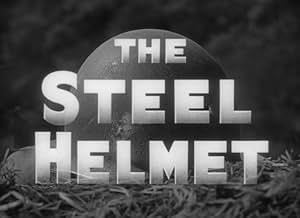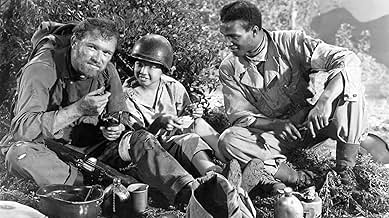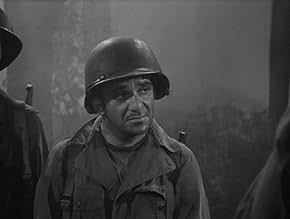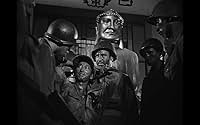Une bande indisciplinée de laissés-pour-compte américains se bat contre des troupes communistes supérieures en nombre dans un temple bouddhiste abandonné pendant la Guerre de Corée.Une bande indisciplinée de laissés-pour-compte américains se bat contre des troupes communistes supérieures en nombre dans un temple bouddhiste abandonné pendant la Guerre de Corée.Une bande indisciplinée de laissés-pour-compte américains se bat contre des troupes communistes supérieures en nombre dans un temple bouddhiste abandonné pendant la Guerre de Corée.
- Récompenses
- 1 victoire au total
Avis à la une
I saw the film originally in its year of release and was riveted to the screen. For me, the best element of the film is Gene Evans' portrayal of Sgt. Zack, a hard boiled, but not cast-iron career soldier. I've not seen anything of Gene's to rival this portrayal.
Viewed as a document both for, and yet a little ahead of its time, Steel Helmet is a great lower budget contribution to the film literature of the Korean War.
The Steel Helmet tells of a group of infantrymen who have come together by literally running into each other by chance. They travel to a Buddhist temple to set up an observation post, but are soon surrounded by the Communist army. There is then a massive battle that is not exactly pretty for the Americans.
The story is good and moves along at a rate which will keep you intrigued, the battle scenes are very good, and I especially like the part where the medic takes off his helmet, rips off his Red Cross armband and fires the machine gun after the man that was operating it was killed. I wish this movie would come onto video or at least be shown on TV so I can tape it. 8/10
Le saviez-vous
- AnecdotesFilmed in ten days only six months after the outbreak of hostilities, this film became the first Korean War movie.
- GaffesShort Round sings the South Korean National Anthem to the tune of "Auld Lang Syne" while Pvt. Bronte plays on his organ. However, the music to South Korea's national anthem was changed from Auld Lang Syne to the Finale of Korea Fantasiaat at a ceremony celebrating the founding of South Korea on August 15th, 1948, exactly three years after liberation from Japanese rule, and three years before The Steel Helmet was made.
- Citations
The Red: I just don't understand you. You can't eat with them unless there's a war. Even then, it's difficult. Isn't that so?
Cpl. Thompson: That's right.
The Red: You pay for a ticket, but you even have to sit in the back of a public bus. Isn't that so?
Cpl. Thompson: That's right. A hundred years ago, I couldn't even ride a bus. At least now I can sit in the back. Maybe in fifty years, sit in the middle. Someday even up front. There's some things you just can't rush.
- Crédits fousInstead of the traditional "The End", the closing title reads, "There is no end to this story".
- ConnexionsFeatured in The Typewriter, the Rifle & the Movie Camera (1996)
- Bandes originalesAuld Lang Syne
Traditional
Meilleurs choix
- How long is The Steel Helmet?Alimenté par Alexa
Détails
Box-office
- Budget
- 103 000 $US (estimé)
- Durée1 heure 25 minutes
- Couleur
- Rapport de forme
- 1.37 : 1
Contribuer à cette page





























